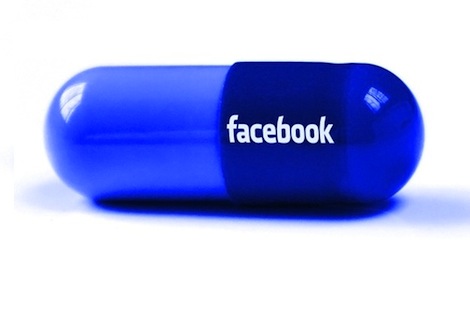
By the end of March 2012, there were a reported 901 million monthly active users on Facebook. Does this staggering truth beg the question of what the new "drug" addiction could be?

The buzz about Facebook is big this week as the potential sharks await their IPO, scheduled within the happen the next couple weeks. There is no denying it has become everyone’s favorite obsession and other than some press regarding its negative role in precipitating cyber-bullying, few people consider an equally worrisome concern: becoming an addict.
Although other forms of internet addiction have been going on since the birth of the web and specifically internet porn and gaming has continued to surge as common addictions, the potential impact of Facebook on addictive behavior is unprecedented. Consider that 40 percent of the population in recent polls admits to using Facebook on a regular basis. The age range of users spans from kids under 10 years old to adults over 80 years old. The staggering ability to span such a wide-spread age-group is what makes it so concerning with respect to addiction.
If you look at another common internet addiction, internet porn, the vast majority of people addicted are males in the age range of 17-51 according to recent data on the subject. Another example of a a wide-spread addiction is illicit drug and alcohol use. Although both males and females are nearly equal offenders, the age range typically spans a narrower window. The only comparison to the impact of Facebook is cigarette smoking, especially 10 plus years ago before smoking rates have steadily decreased.
Why is this important? First, consider why Facebook can be classified as an addiction. One of strongest pieces of evidence is the presence of physical withdrawal symptoms in people who abruptly stop using their Facebook and social media outlets. Several well designed studies measuring symptoms such as galvanic skin response (sweating), elevated heart rate, insomnia and feelings of anxiety/restlessness, are present in these people. These are identical symptoms, although in a more mild form, to drug/alcohol withdrawal.
Another clear piece of evidence is that Facebook over-use fits the definition psychiatrists use for drug dependence and includes the following criteria-Tolerance of the “drug” is built up over time; more and more time is spent on Facebook without realizing the enormous amount of time wasted. The “drug” is taken in larger amounts or for longer periods than initially anticipated; most users admit that when they started using, they did not anticipate it would consume their lives. A persistent desire to cut-down or stop using the “drug.” A great deal of time is spent either using or obtaining the “drug.” Important social, occupational and recreational activities are given up or reduced due to use of the “drug.” Last, the drug is continued despite knowledge of having a recurrent psychological or physical problem caused by the “drug.”

It becomes very clear why users of Facebook and parents of users need to start taking notice. How is a Facebook addiction physiologically possible? The brain has primary pleasure centers and reward circuitry (specifically referred to the nucleus accumbens). This brain area and related circuitry does not differentiate pleasure derived from one activity to another as long as it feels good. Specifically food, sex, drugs and now, Facebook all flood the pleasure centers with dopamine, the neurotransmitter most involved with the reward system. This reward system is the most primitive aspects of the human brain and something we share with all animals. The primal instinct that drives us to drink when thirsty, eat when hungry or have sex when sexually aroused is the same instinct that causes humans to continue pleasurable but addictive behaviors. The reward circuitry is connected to many important brain circuits involved in higher reasoning, motivation, rational thinking and physical bodily sensations. It is the intricate relationship of this circuitry in the context of a person’s genetic make-up that dictates susceptibility to becoming an addict.
With proof Facebook indeed fits the definition of an addiction, is it a gateway for kids and adults alike to advance to more dangerous addictions? While Facebook has not been around long enough to collect good data on this phenomenon, one can easily hypothesize that inevitably it will have similar effects as marijuana or other ‘gateway” drugs in terms of propagating further addiction. This does not mean that everyone using Facebook will progress to more dangerous behaviors but like all other addictions, the “perfect storm” of susceptible underlying genetics and a ones environment will ultimately dictate whether someone becomes an addict.
One key unique concern of Facebook addiction is the presence of an addiction at ages so young that the brain is still malleable and developing. Older teens and adults who partake in almost all other addictive behaviors on a regular basis have essentially fully developed brains. Their brains are “equipped” with their specific circuitry and structure. However what if extremely early age addiction “turns-on” the susceptible genes in genetically pre-programmed kids at ages when the brain has yet to fully develop? Even in a fully developed brain, the ability to strengthen and modify reward circuitry is immense but a developing brain has more potential to develop more potent reward circuitry leading to even stronger primal reward seeking behaviors.
Although this is a hypothesize at this point given the relatively short amount of time Facebook has been around, with more time, imaging, genetics and further research, people will be surprised at the eventual impact of Facebook. If you have doubts, keep in mind, decades ago, tobacco was considered benign and pleasurable. The long-term consequences it has on mind and body were greatly underestimated. Facebook may not cause cancer but deterioration of other important aspects of one’s life is a real possibility.
Michael Yasinski M.D
[Michael Yasinski M.D is a Scottsdale Psychiatrist with his own house-call practice-Yasinskipsychiatry.com]